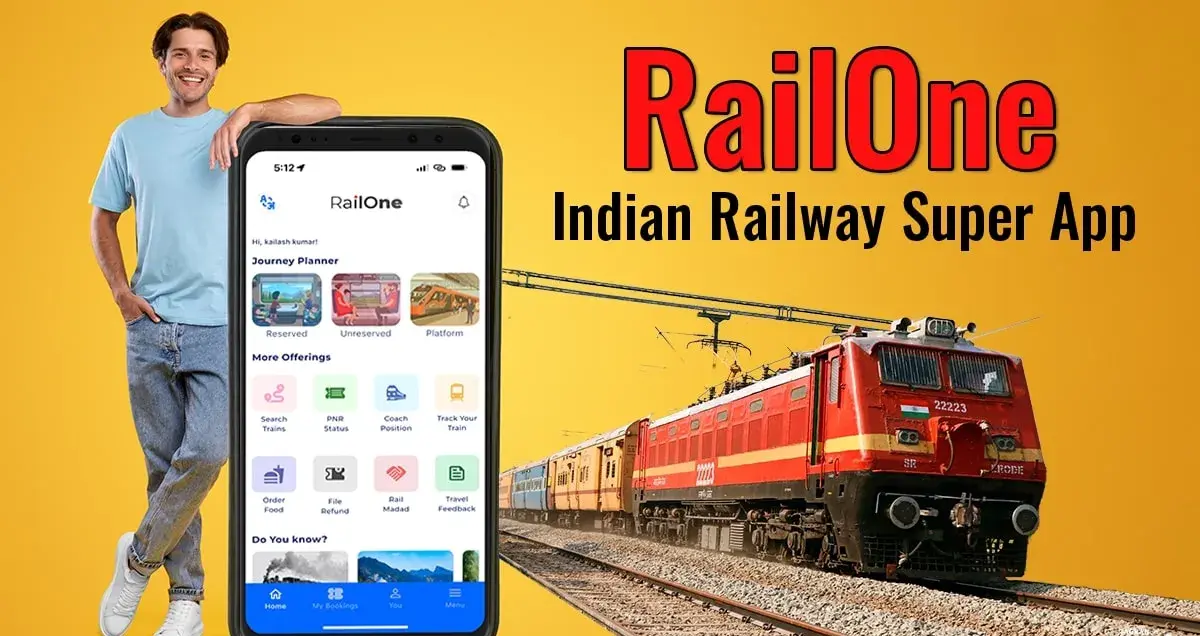Indian Railways has launched RailOne, a newly developed ‘super app’ designed to centralise and simplify all passenger-facing railway services. From booking reserved and unreserved tickets to tracking train schedules and ordering food, RailOne is now positioned as a single destination for users, ushering in a new era of seamless digital travel.
Developed by the Centre for Railway Information Systems (CRIS), RailOne integrates a wide array of features that were previously scattered across several standalone applications. These include IRCTC ticket bookings, unreserved ticketing via UTS, live train tracking from the National Train Enquiry System, coach positioning, feedback mechanisms under Rail Madad, and in-app food ordering services. The application also supports the Railway’s digital wallet system, R-Wallet, enabling secure, biometric-enabled, or mPIN-based transactions directly within the platform. Available on Android and iOS, RailOne offers a clean, multilingual interface and supports single sign-on functionality. Users with existing credentials on platforms like Rail Connect or UTSonMobile can seamlessly transition without the need for multiple logins or passwords. Guest users too can access core features using basic mobile OTP authentication, making the app accessible to a wider demographic, including occasional travellers and rural users.
Officials confirmed that RailOne is part of Indian Railways’ broader digital transformation agenda aimed at improving efficiency, sustainability, and accessibility in public transport. By unifying disparate services, the app helps eliminate redundancies, reduces the need for multiple downloads, and minimises device storage and data usage—making it a more energy-efficient option for digitally connected citizens. This, experts say, is a small yet vital step toward greener public transport systems. What sets RailOne apart is its inclusion of reforms tied to the Indian Railways’ evolving passenger reservation system. From July 2025, only verified users—authenticated through Aadhaar or DigiLocker—will be allowed to access Tatkal ticket bookings. Additionally, train chart preparation timings will be advanced from four hours to eight hours prior to departure, a move that will allow waitlisted passengers earlier access to final ticket statuses.
Further backend enhancements are expected by the end of the year. Officials revealed that the updated reservation infrastructure, currently being overhauled by CRIS, will handle up to 150,000 bookings and four million service enquiries per minute. Special accommodations are also being integrated for Divyangjan passengers, students, and patients, reaffirming Railways’ commitment to inclusivity and equity. Industry watchers and digital mobility analysts have praised the rollout as a long-overdue leap forward. An official from the digital transport sector observed that consolidating IRCTC, UTS, Rail Madad, food delivery, and train enquiry into a single interface is “a strategically sound move,” which reflects a maturing understanding of how commuters interact with railway systems in real-time. Experts also noted that a unified application structure can reduce the carbon footprint associated with multiple application downloads and frequent software updates—a subtle but meaningful contribution to sustainable technology usage.
However, the transition is not without concerns. While RailOne integrates user functions seamlessly, IRCTC will continue levying convenience fees for bookings made via the platform. There are also questions surrounding the real-time load capacity of the system, especially during high-demand windows such as Tatkal booking hours. In the past, passengers have routinely reported outages and slow response times under peak loads—a challenge the new backend architecture aims to mitigate. Additionally, while RailOne offers a standardised user experience, the real test lies in its coordination with third-party food vendors, railway zones, and complaint redressal cells. Service standardisation and vendor accountability will be critical if the platform is to truly improve passenger satisfaction.
For the average passenger, though, the transformation is already visible. With a single login, users can now perform actions that previously required switching between multiple apps—book a reserved or general ticket, check PNR status, locate their coach, order meals, and even file a service complaint. For digital natives, the experience is akin to using an all-in-one banking or delivery app—intuitive, responsive, and centralised. Urban mobility planners have called the RailOne initiative a major stride toward democratising access to real-time transport data. By reducing digital entry barriers, enabling multi-language support, and supporting low-bandwidth environments, Indian Railways is expanding its digital footprint to reach passengers from diverse socioeconomic backgrounds. This aligns with broader government goals around digital inclusion and public infrastructure resilience.
From an environmental standpoint, the app contributes indirectly to the broader urban sustainability agenda. Reduced app clutter leads to fewer data transfers, lower e-waste from redundant app development, and better energy management across millions of devices—an important if often overlooked element in the drive toward zero-carbon cities. RailOne may ultimately redefine how Indians interact with their railway network. While its success hinges on backend stability, user adoption, and real-world service delivery, the ambition behind the platform is unmistakable. It aims not just to simplify transactions, but to make the entire experience of train travel more intuitive, inclusive, and environmentally responsible.
With India’s railway network moving toward deeper digitisation, RailOne is not merely an app—it is a foundation for future-ready mobility. Whether the platform lives up to its promise will depend on the Indian Railways’ ability to continuously refine, scale, and support this digital infrastructure for the millions who depend on it daily.
Also Read : Maharashtra Identifies Four Bridges Very Dangerous Following Structural Review


